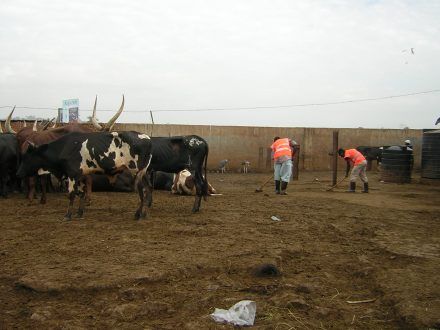Report from Western Kenya on training for community service supervisors
3rd July 2013

A national strike by Kenya’s teachers has not prevented more than fifteen school heads and deputy heads taking part in PRI’s latest training seminars designed to promote alternatives to prison in East Africa.
Schools are among the wide range of institutions where offenders sentenced to Community Service Orders (CSOs) undertake unpaid work for the benefit of the public. We visited the Muslim Primary school in Bungoma, where offenders had helped to build new toilet blocks and classrooms; people convicted of minor crimes can be sent to work in local chief’s offices and dispensaries, in police stations and forestry departments. Having sponsored a series of training events for magistrates aimed at increasing the numbers of CSOs imposed by the courts, PRI is now working with the Kenya Probation Service to improve the quality of supervision offenders receive once the orders are made.
Almost a hundred officials from government departments have gathered his week in the small town of Webuye to share experiences of initiating successful community service projects, learn how to handle uncooperative offenders, and disseminate the results of work to local communities.
With limited resources, the scale of community service projects is inevitably limited but supervisors are encouraged to offer work with tangible results rather than just ‘slashing’ overgrown bushes or cleaning buildings. CSOs can also give opportunities to learn new skills which can help offenders earn a legitimate income. We visited a beekeeping project in Kakamega, where offenders can learn to harvest honey, an alternative livelihood to illegal brewing of Changaa which brings many poor people before the courts in rural Kenya.
Placements which usually involve three or four hours a day, are deliberately designed to allow offenders to retain any paid employment or to work their own land so that they can support their families. For some, the demands of even short orders are too much; supervisors are encouraged to report non compliance promptly but the police can be reluctant to execute resulting warrants for arrest. Active involvement by the Chiefs, the officials responsible for the smallest administrative units can be important in getting offenders to complete their hours and following up when they do not.
One or two participants in the training were concerned that the flexible working arrangements and training opportunities were too much of a soft option, giving an unfair advantage to criminals over the law abiding. The vast majority saw the case for putting petty offenders to work in the community rather than filling already congested jails. They left with tasks to sensitise their colleagues about the benefits of community service, to develop more ambitious work profiles for offenders and to document the impact of the work. PRI and Kenya Probation will be following up on progress later in the year.